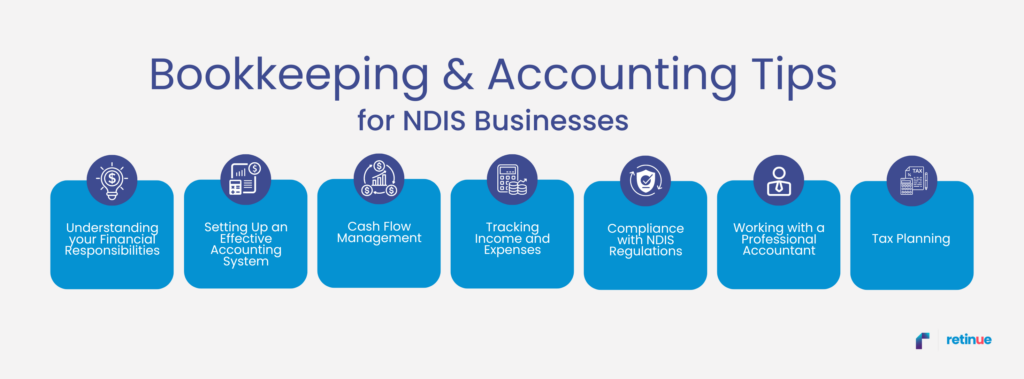
18 September 2024
Operating an NDIS (National Disability Insurance Scheme) business in Australia brings its own unique set of challenges, especially when it comes to managing finances. NDIS businesses not only need to ensure compliance with the NDIS framework, but they must also effectively manage their accounting and bookkeeping to maintain financial health and sustainability.
For many service providers, the key to long-term success lies in establishing solid financial practices early on.
In this blog, we’ll explore the accounting and bookkeeping essentials every NDIS business needs to thrive, from managing cash flow to maintaining compliance with NDIS regulations.

The first step for any NDIS provider is to understand the unique financial requirements of running an NDIS business. The NDIS operates with its own specific billing system, which involves submitting claims via the NDIS portal.
These claims must accurately reflect the services provided, which can add a layer of complexity to your bookkeeping. As a result, NDIS businesses must have accurate records of client services, hours worked, and appropriate billing codes.
It’s also crucial to understand your tax obligations. Like all businesses, NDIS providers must report income, expenses, and ensure compliance with GST (if registered) and other tax-related obligations. Failing to accurately manage these financial responsibilities can result in significant penalties or delays in payments from the NDIS.
Establishing an efficient accounting system is critical for NDIS businesses to stay organised and compliant. Cloud accounting platforms like Xero & MYOB are popular choices for small businesses, including NDIS providers, because they offer simple and streamlined solutions for managing finances. These platforms allow businesses to automate invoicing, monitor cash flow, and track expenses with ease.
Cash flow is the lifeblood of any business, but for NDIS providers, managing cash flow can be tricky due to delays in receiving payments from the NDIS. These delays can create challenges in paying staff, covering operational costs, or expanding services.
To avoid cash flow issues, it’s essential to create a cash flow forecast. This forecast will help you plan for upcoming expenses, identify periods where cash flow may be tight, and ensure you have sufficient funds to continue operations smoothly. Some NDIS businesses choose to set up a dedicated reserve fund to handle cash flow gaps while waiting for payments.
Additionally, businesses should regularly review their accounts receivable to follow up on outstanding claims or incorrect payments from the NDIS. By proactively managing cash flow, NDIS businesses can prevent disruptions to their services.
Accurate tracking of income and expenses is another core element of sound bookkeeping. NDIS providers often have multiple income streams, such as NDIS payments, private client fees, and other sources of funding. It’s essential to track each income source separately and record it correctly in your accounting software.
Expenses, too, must be carefully monitored. NDIS providers need to track costs related to service delivery, staff wages, office supplies, technology, and other overheads. This will not only help you stay organised but also make it easier to prepare for tax time and report your business’s financial position accurately.
NDIS businesses should regularly review their Profit and Loss (P&L) statements to ensure expenses aren’t exceeding revenue. An accurate P&L report can provide key insights into areas where cost savings can be made and highlight opportunities for financial growth.
One of the most important aspects of operating an NDIS business is maintaining compliance with NDIS financial regulations. Providers must meet strict record-keeping standards, including detailed accounts of services provided, claims submitted, and payments received from the NDIS.
To ensure compliance, NDIS businesses must maintain accurate records of their financial transactions and keep supporting documentation, such as invoices, receipts, and service agreements. These records should be stored securely and be easily accessible in case of an audit.
Regular audits from the NDIS Quality and Safeguards Commission are part of operating under the NDIS framework. During these audits, providers will need to demonstrate that they are financially sound and that their accounting practices meet the required standards.
Given the complexities of NDIS finances, many providers choose to work with a professional accountant or bookkeeper. An accountant can help ensure that your business meets its financial obligations, remains compliant with tax and NDIS regulations, and offers insights into improving your financial health.
Partnering with an accountant can also help you identify opportunities for growth and ensure that your business’s financial practices are optimised for long-term success.
Effective tax planning is vital for any NDIS business, as it helps reduce tax liabilities and maximise deductions. NDIS providers can claim a range of tax deductions, including expenses related to staffing, operational costs, equipment purchases, and professional development.
A good accountant can help you identify all eligible deductions and ensure that your business is structured in the most tax-efficient way possible. This can include advising on GST registration, reviewing superannuation obligations, and assisting with BAS (Business Activity Statement) lodgements.
Running an NDIS business requires careful financial management and a deep understanding of both accounting principles and NDIS regulations. By implementing an effective accounting system, managing cash flow, tracking income and expenses, and staying compliant with NDIS requirements, your business can remain financially healthy and sustainable.
For NDIS providers, investing in professional financial advice and staying on top of your bookkeeping is essential to long-term success. With the right approach, you can focus on what matters most—delivering quality care and support to your clients.
*Retinue’s (ABN 66 658 618 449) payroll service includes the processing of hours and wages rates provided by you. We do not determine award rates for your employees or provide advice on the correct employment status of your employees. It is your responsibility to ensure that your employees are paid correctly and we recommend obtaining advice from specialised employment relations experts.
Protection is only provided for ATO investigations notified to us during the period which you are a client and relating to any tax returns or lodgements prepared by us. Fines includes any penalties and interest that may result from any errors made by us but does not include any additional tax liability that may result from an amended lodgement.
Liability limited by a scheme approved under Professional Standards Legislation.
©2024 Retinue. All rights.